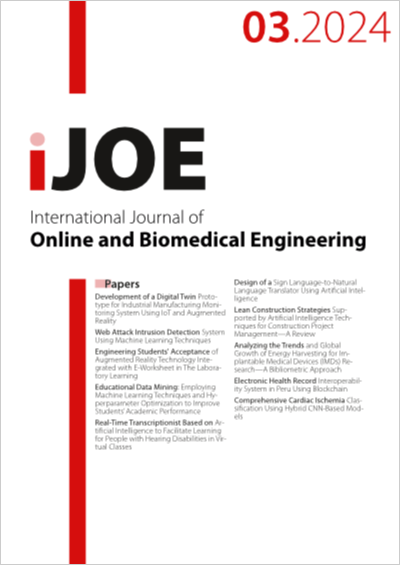Electronic Health Record Interoperability System in Peru Using Blockchain
DOI:
https://doi.org/10.3991/ijoe.v20i03.44507Keywords:
interoperability, HCE, blockchain-FHIR, HL7, ipfsAbstract
In Peru, there is currently no integrated electronic health record (EHR) system that can be automatically shared between healthcare facilities. This leads to increased service costs due to duplicated examinations and records, as well as additional time required to manage patients’ clinical information. One alternative for ensuring the secure interoperability of EHRs while preserving data privacy is the use of blockchain technology. However, existing works consider a pre-established format for exchanging EHRs, which is not applicable when systems have different formats, as is the case in Peru. This work proposes an architecture and a web application for exchanging EHRs in heterogeneous systems. The proposed system includes the homologation of an EHR with rapid interoperability resources for medical attention using FHIR HL7, and vice versa, to achieve interoperability. Additionally, it utilizes blockchain technology to ensure data security and privacy. The web application was tested using a case simulation to demonstrate EHR interoperability between clinics in a clear, secure, and efficient manner. In addition, a survey was conducted with 30 patients regarding adoption, and another survey was conducted with 10 doctors from a public hospital in Peru regarding usability. The results demonstrate a very high level of adoption and usability for them all. Unlike other studies, the proposal does not necessitate alterations to existing EHR systems for interoperability. In other words, the proposal presents a feasible and cost-effective alternative to addressing the EHR interoperability issue in clinics and hospitals in Peru.
Downloads
Published
How to Cite
Issue
Section
License
Copyright (c) 2023 Pedro Castañeda, Paulo Llanos-Colchado, Leandro Cutipa-Salazar, David Mauricio, Roberth Chuquimbalqui-Maslucán, Leonardo Rojas-Mezarina, José Luis Castillo-Sequera

This work is licensed under a Creative Commons Attribution 4.0 International License.



